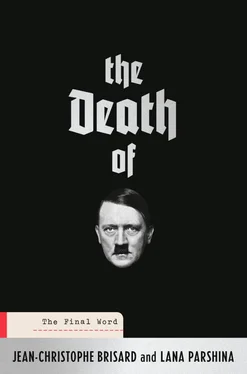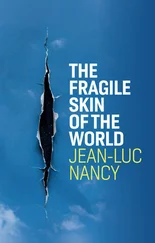Jean-Christophe Brisard and Lana Parshina
THE DEATH OF HITLER
THE FINAL WORD
Cover
Title Page
Copyright
Part I: The Investigation (I)
Moscow, 6 April 2016
Berlin, May 1945
Moscow, October 2016
Paris, October–November 2016
Part II: The Last Days of Hitler
19 April: “Where are the Russians? Is the front holding? What’s the Führer doing? When is he leaving Berlin?”
20 April: “Führer’s birthday. Sadly no one is in the mood for a party.”
21 April: “This is the final act.”
22 April: “The war is lost.”
23 April: “I know Göring is rotten. ”
24 April: “Soldiers, wounded men, all of you to arms! ”
25 April: “Poor, poor Adolf. Abandoned by everyone, betrayed by everyone! ”
26 April: “Stay alive, my Führer, it’s the will of every German! ”
27 April: “Eva, you must leave the Führer… ”
28 April: “Himmler’s Opening Gambit To End European War”
29 April: “In the presence of witnesses, I ask you, my Führer Adolf Hitler, if you wish to join Frau Eva Braun in matrimony? ”
30 April: “Where are your planes?”
1 May: “Hitler is dead. He fought to his last breath for Germany against Bolshevism .”
2 May: “Hitler has escaped! ”
Part III: The Investigation (II)
Moscow, December 2016
Lubyanka, Moscow, December 2016
Berlin, 2 May 1945
Moscow, March 2017
Moscow, May 1945
Russian State Military Archives, Moscow, March 2017
Part IV: Conclusions?
Moscow, March 2017
Berlin, 30 May 1946
Summer 2017
Paris, September 2017
Epilogue
Photo Addendum
Acknowledgements
Notes on the Archives
Index
PART I
THE INVESTIGATION (I)
Lana is perplexed.
Her contacts within the senior Russian administration have made no bones about how hard it is going to be for us to achieve our objective. Our meeting for 11:00 has been confirmed, but in Russia that doesn’t necessarily mean anything. Our faces are stung by frost as we approach the area around the “State Archives of the Russian Federation.” In Russia they’re called GARF (Gosudartstennyy Arkhiv Rossyskov Federatsii). A national institution right in the heart of Moscow. It is based around one of the biggest archive collections in the country, with almost 7 million documents from the nineteenth century to the present day. Chiefly paper documents, but also some photographs and secret files. And it’s for one of those secret files that we are braving the harsh Muscovite climate as well as the no less rough Russian bureaucracy. Lana Parshina isn’t entirely unknown in Russia. A journalist and documentary maker, this young Russian-American woman is regularly invited onto television platforms to talk about what remains her major achievement: the last interview with Lana Peters. Lana Peters was a penniless old woman, forgotten by everyone in a hospice for the poor in the depths of the United States. She hid herself away and refused to talk to journalists. Let alone discuss the memory of her father, one Josef Vissarionovich Djugashvili, otherwise known as Stalin. Lana Peters’ name was in fact Svetlana Stalin, and she was the dictator’s favourite daughter. At the height of the Cold War in the 1960s, she had fled the country and applied to the US for political asylum. From that moment she became the symbol of those Soviets who were prepared to do anything to escape a tyrannical regime. Lana Parshina had managed to persuade the dictator’s shy descendant to grant her a series of filmed interviews. That was in 2008. It was a success that attracted attention all over Russia. Stalin has in fact been coming back into fashion in Moscow for a number of years. Lana Parshina knows the complex gear-wheels of the administrative and bureaucratic Russian machine only too well. She knows how to get access to secret, sensitive, and complex files.
And yet on that morning in April 2016, I sense that she’s worried. We have a meeting with the director of GARF, Larisa Alexandrovna Rogovaya. She alone can authorise us to consult File H. “H” for Hitler.
The tone is set as soon as we enter the main hall of GARF. A soldier with a very 1970s moustache, a bit like Freddie Mercury’s, demands to see our passports. “Check!” he bellows, as if we were intruders. Lana, with her Russian ID, isn’t a problem. My French passport complicates matters. The soldier doesn’t seem at ease with the Latin alphabet, and can’t decipher my name. In Cyrillic characters, Brisard becomes БРИЗАР. That’s how I’m listed in the file of people who have been granted access for the day. After a long check and Lana’s life-saving assistance, we are finally allowed through. The office of the director general of the archives? The lowly official was horrified by the mere question. He was already tending to his next customer with the same cordial tone. “Right at the end, after the third building on the right.” The young woman who answered our question didn’t wait for our thanks before turning her back on us and climbing the dimly lit stairs. GARF looks like a Soviet workers’ city. It spreads over several buildings with sinister façades in the most austere Soviet style, a mixture of constructivism and rationalism. We wander from one building to another, trying to avoid the big puddles of muddy snow. “General Director,” large letters announce on a plaque above a double door in the distance. A black sedan bars the entrance. We have another twenty or so metres to go when a woman with an imposing build hurries from the building to dive into the vehicle.
“That’s the director,” Lana murmurs with a note of despair as she watches the car driving away.
It’s 10:55, and our 11:00 meeting has just flown away from under our noses.
Welcome to Russia.
The two secretaries of the director of GARF have shared out the roles between them: one nice, the other frankly unpleasant.
“What’s it about?”
Even if you don’t understand a language, which is my case with Russian, it’s easy to sense when someone’s being rude to you. So the younger woman–if I wished to be rude I would say the less old of the two–is not our friend.
Lana introduces us, we are the two journalists, she is Russian and I’m French. We’re here because we had a meeting with the director, and also to view a rather special object.
“You won’t see her!” the hostile secretary cuts in. “She’s left for the day. She isn’t here.” Lana explains that we know that already–the dark car outside, the director forgetting that we’re there and evaporating right in front of us. She says all that without shedding an ounce of her enthusiasm. Might waiting be an option? “If it amuses you,” the secretary says at last, leaving the room with a stack of files under her arm, to suggest the importance of the time of which we have dared to deprive her. A Swiss cuckoo clock hangs on the wall above her desk. It says 11:10. The other assistant has been listening to her colleague without a word. Her contrite expression hasn’t escaped us. Lana walks over to her.
A meeting at the Kremlin, in the president’s office. It wasn’t in the director’s diary. Clearly, when Putin or, more probably, his cabinet rings, you run, the secretary explains, lowering her voice, in short phrases. She seems so sweet and her voice is comforting, in spite of the rather negative nature of the information that she’s giving us. And who knows when the director will be back? She doesn’t, at any rate. Has she been summoned away at the last minute because of us? “No. Why would it be because of you?”
Читать дальше













